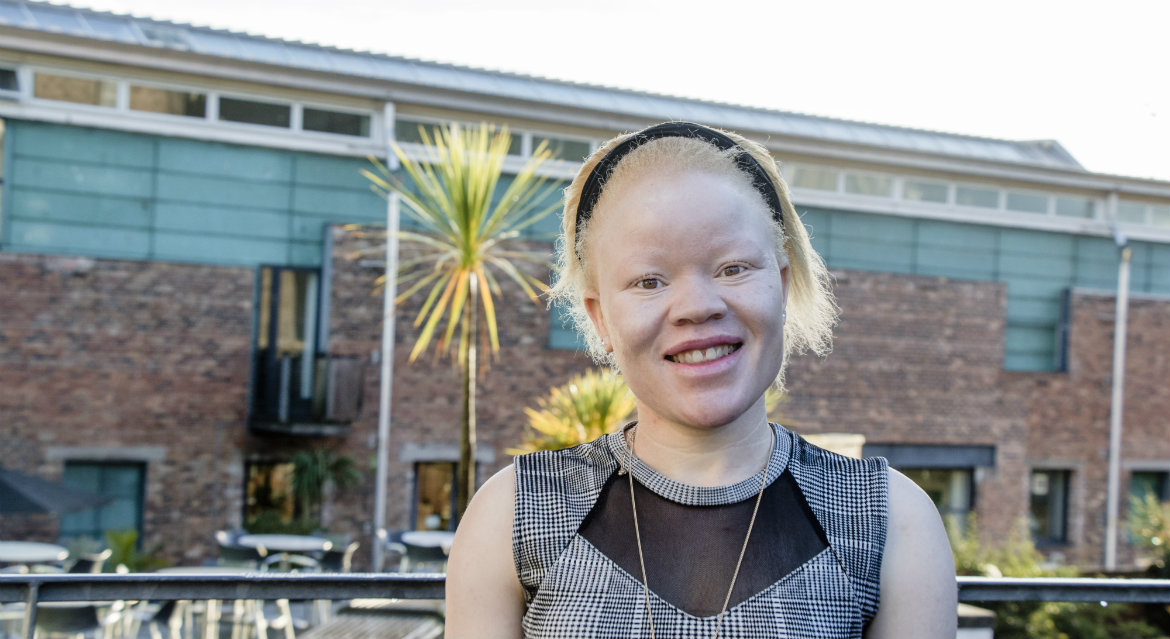Albinism campaigner speaks of being hunted for body parts
Published On Mon 10 Dec 2018 by Grant Hill

A human rights campaigner, who has just completed a fellowship at the University of Dundee, has spoken of how she and other people with albinism are “hunted like animals” in her home country of Malawi.
Tumeliwa Mphepo is one of three international activists who spent a semester at the University as part of the Scottish Human Rights Defender Fellowship initiative. Participants spent three months in Scotland, combining study at Dundee with the chance to build relationships and share expertise with Scottish human rights and equality organisations.
The Fellowship is a partnership between the Scottish Government and the University, supported by campaign groups Front Line Defenders, Amnesty International, Scottish Catholic International Aid Fund and Beyond Borders Scotland.
While the other Fellows cannot be named so as to not put them at risk in their home countries, such is the danger they face as a result of their humanitarian work, Tumeliwa has waived her anonymity to speak out against the ritual killing of people with albinism.
Amnesty International has described the situation in Malawi as a human rights crisis, with thousands of people with albinism – particularly children – being at serious risk of abduction and killing. People born with the genetic condition are being hunted for their bones and body parts, which are then sold for witchcraft. Despite increasingly fierce rhetoric on the subject within the country, perpetrators are largely going unpunished.
“People like me are being hunted like animals in Malawi and other parts of Africa,” she said. “There has been a big increase in the number of atrocities against people with albinism, with some 159 cases in Malawi in just a few years. This has been a problem in the background for years but the current challenges we are facing has brought it to light. We cannot be silent about this.
“This is not the fault of the government and there are people within the government trying to counter these beliefs but it is a slow process and the action is not happening quickly enough for those of us at risk.
“A lot of discrimination exists against people with albinism in education and employment meaning they tend to fall into the lowest socio-economic bracket and are the most vulnerable as a result of their poverty.”
A good night’s rest is something most people take for granted. For the three Human Rights Defender Fellows, it is a luxury. The very real possibility of would-be jailors, torturers and murderers breaking down their door keeps them awake as they lie in bed at home. As such, the feeling of peacefulness they have experienced in Dundee has been as welcome as the educational opportunities that the research fellowship has afforded them.
“I have slept more in the past three months than I have in a very long time,” said one of the Fellows, a lawyer targeted by his country’s authorities for his work defending human rights. “Here I have gone to bed without fear. I am relaxed in Dundee because I know the police will not raid my home in the middle of the night. We have all had a break from persecution in Scotland.
“Since coming here, we have had the chance to get to know Scotland as well as meeting with the activist community and develop our understanding of other serious international problems. We have made friendships and built solidarity with the people we have met here and I think it has also been very beneficial for the activists in Scotland to meet with us and hear about our experiences.”
The third Fellow also comes from a country where the government has instigated a brutal crackdown on human rights.
“Other human rights defenders have been detained or have disappeared,” he said. “If I was to become known as an activist then I would be killed. They target the families of activists as well. Even my colleagues don’t know I have been in Scotland.
“This Fellowship has allowed me to meet great people and make contacts. I have gained knowledge and attended classes. I have also had a good chance to rest here without moving. Human rights defenders in my country must always be moving from house to house to avoid detection and it is very stressful.”
Kurt Mills, Professor of International Relations and Human Rights at the University, paid tribute to all three Fellows, saying, “It has been an honour and pleasure to host our three human rights defenders this semester. Hosting this fellowship aligns directly with the values of the University, and we are very pleased to be able to support the important and brave work these individuals do.
“I would like to thank the Scottish Government and the EU Human Right Defenders mechanism for their support, as well as our key civil society partners.”
Scottish Government Equalities Minister Christina McKelvie said, “It has been a pleasure to welcome the human rights defenders to Scotland and I hope they found their time here as rewarding as I found it inspiring.
“They face challenges in their work that nobody should have to deal with and I find the manner in which they respond to be frankly humbling. I hope the three months they have spent here has shown them how much their efforts are appreciated but I also hope it gives them the energy to continue their essential work – ending discrimination and upholding human rights”.
For media enquiries contact:
Grant Hill
Press Officer
University of Dundee
Nethergate, Dundee, DD1 4HN
Tel: +44 (0)1382 384768
Mobile: 07854 953277
Email: g.hill@dundee.ac.uk